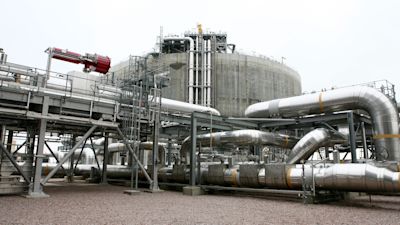Insight
Gas supplies could be diverted from Asia amid fears of war between Russia and Ukraine

Supplies of liquefied natural gas (LNG) could be diverted from China, South Korea and Japan as part of a complex diplomatic plan being drawn up to prepare for war in Ukraine, ITV News has learned. American officials believe fears among EU allies that a conflict might disrupt Russian supplies of gas will soften support for US actions. Germany’s dependence on Russian gas has made it particularly vulnerable if Moscow stops exports to the West as part of its political response to promised sanctions.
To shore up political support, the US government has requested that Qatar, the world’s largest exporter of LNG, finds a way to help provide supplies, perhaps redirecting shipments assigned to Asian countries if an agreement can be reached.
The arrangements could be finalised at a meeting between President Joe Biden and Qatar’s Emir Sheikh Tamim bin Hamad Al-Thani at the White House during the coming days, two people familiar with the proposals told ITV News.
“In the short term it will be dependent on the willingness of other client countries to reroute and the availability of unallocated LNG” said an official familiar with the discussions.
"However, Qatar did reroute its supplies in 2010 for Japan after the tsunami hit so there’s precedent, but only if there’s a crisis." The Kremlin has assembled more than 100,000 troops on the border with Ukraine, leading to concerns it intends to invade. A war in Ukraine is likely to raise fresh questions about whether European countries should find new ways to diversify their gas supplies. Russia supplies about 40% of the EU’s natural gas. Britain is less dependent on Russia for its gas.
Germany’s new chancellor is under pressure to make Nord Stream 2, a gas pipeline connecting Russia and Germany, part of the “massive price” to be paid in the event of a Russian invasion of Ukraine. The German energy regulator has delayed a decision on the certification of the project.